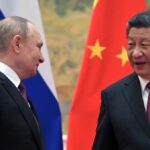
Good morning, Chicago.
Russia launched a full-scale invasion of Ukraine in what a NATO official called a “brutal act of war” that shattered peace in Europe. In response, President Biden ordered broad new sanctions, declaring that Russian leader Vladimir Putin “chose this war.” Shocked Russians turned out by the thousands to protest their country’s invasion of Ukraine, as many are seeing Putin in a different light.
On Friday, Russia pressed its invasion of Ukraine to the outskirts of Kyiv.
At a Chicago rally, feelings ranged from anxiety and dread to numbness and heartbreak on a frantic day of trying to contact family members in Ukraine.
“Ukrainians will fight. Ukrainians will resist. Ukrainians just need our support,” Pavlo Bandriwsky, of the Ukrainian Congress Committee of America in Illinois, said to rallygoers. “They will do what they need to do, because for Ukraine, this is existential battle.”
Members of both parties in Illinois’ congressional delegation overwhelmingly denounced Russian President Vladimir Putin’s invasion of Ukraine — with one exception.
Here are the top stories you need to know to start your day.
COVID-19 tracker | More newsletters | Puzzles & Games | Daily horoscope | Ask Amy | Today’s eNewspaper edition
Chicago speed cameras nabbed drivers around school when kids weren’t in class: ‘6 mph over and they’ll ticket you every time’
On a Friday in November when a Southwest Side charter school was closed to give students a chance to get vaccinated against COVID-19, nearly two dozen cars nonetheless got hit for speeding in the nearby automated camera “school safety zone.”
The Tribune received data through an open records request about all speed camera tickets near schools on “vaccine awareness day,” when Chicago Public Schools and other schools shut down to promote the idea students should get vaccinated. After a reporter informed the Chicago Department of Transportation cars were ticketed passing Major Hector Garcia when the campus was closed, the city said it would cancel outstanding citations and offer refunds to those who already paid.
Chicago’s new basic income program will open to residents seeking cash assistance in April
Chicago residents will be able to apply to participate in the city’s $500-per-month basic income pilot program in April, Mayor Lori Lightfoot announced. The City Council passed a $31.5 million basic income program as part of Lightfoot’s $16.7 billion budget.
Applicants must be over 18, live in the city, have experienced economic hardship due to COVID-19 and be below 250% of the federal poverty level. That means a household of three can’t have an income higher than $57,575 to be eligible, for instance.
Most Chicago-area theaters and music clubs will keep COVID mask requirements after Feb. 28
With the end date to Illinois and City of Chicago mask mandates close at hand, most music clubs and performing arts venues say they are not yet ready to relax their COVID protocols.
Chicago region grapples with reducing road salt as chloride levels exceed state limits in waterways, continue to rise in Lake Michigan
During icy Midwest winters, a Chicagoan’s step onto the sidewalk is often met with a familiar crunch underfoot. But salt, used to keep roads safe for driving and sidewalks safe for walking, comes with an ecological price: It ends up in our water, and once it’s there, it’s almost impossible to remove.
As levels of chlorides continue to rise in Lake Michigan and exceed state limits in Chicago-area waterways, municipalities across the region are grappling with the urgent need to reduce the use of road salt in winter.
The Illinois wine industry, looking for more retail shelf space, is pushing to change a Prohibition-era distribution law
The Illinois wine industry, a small but growing network of boutique wineries and vineyards dotting the state, is looking for a little more shelf space at your local retailer.
Struggling during the pandemic with a business model built mostly on tours, tastings and in-person sales, Illinois wine producers are pushing for legislation to increase self-distribution to stores and restaurants, bypassing a Prohibition-era state law requiring a middleman in such transactions.




